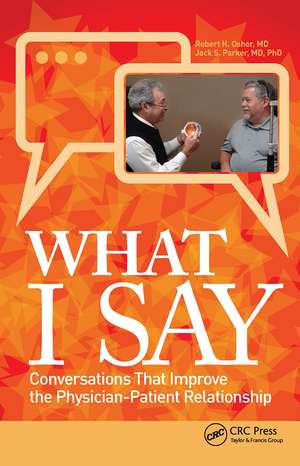What I Say: Conversations That Improve the Physician-Patient Relationship
Autor Robert Osher, Jack Parkeren Limba Engleză Paperback – feb 2019
What I Say: Conversations that Improve the Physician-Patient Relationship is designed to help cataract surgeons to hone their verbal interactions to be as sharp as their surgical skills. Muddled, clumsy, or impromptu explanations diminish the doctor-patient relationship and could prevent patients from receiving the surgery they need or appreciating the results they get.
Knowing in advance which words to use in difficult situations is analogous to knowing how to manage a complication before it occurs. The results are inevitably better when a physician has considered every possible outcome instead of attempting to come up with exactly the right solution on the spot. Rather than figure out the right words by trial and error, however, What I Say has recommendations on exactly what to say to build strong and trusting patient relationships.
Drs. Robert Osher and Jack Parker have compiled conversational scripts from Dr. Osher’s 40-year career in ophthalmology, as well as contributions from over a dozen international mavens of bedside manner into a strategy guide through even the most difficult patient conversations that inevitably surround cataract surgery.
Topics include:
- Lowering Expectations for Spectacle-Free Vision
- The Torn Posterior Capsule
- Postoperative Refractive Surprise
- The Dropped Nucleus
- The Unhappy Patient Despite a Good Result
Containing examples of conversations with cataract surgery patients where informing and reassuring take top priority, What I Say: Conversations that Improve the Physician-Patient Relationship was created to aid cataract surgeons in their pre-operative, intra-operative, and post-operative interactions with patients. With the advice contained inside, surgeons will be able to motivate patients, calibrate expectations, and diffuse frustrations in every possible scenario.
Preț: 485.38 lei
Preț vechi: 510.93 lei
-5% Nou
Puncte Express: 728
Preț estimativ în valută:
92.89€ • 96.62$ • 76.69£
92.89€ • 96.62$ • 76.69£
Carte tipărită la comandă
Livrare economică 14-28 aprilie
Preluare comenzi: 021 569.72.76
Specificații
ISBN-13: 9781630916886
ISBN-10: 1630916889
Pagini: 136
Dimensiuni: 138 x 216 x 10 mm
Greutate: 0.18 kg
Ediția:1
Editura: CRC Press
Colecția CRC Press
ISBN-10: 1630916889
Pagini: 136
Dimensiuni: 138 x 216 x 10 mm
Greutate: 0.18 kg
Ediția:1
Editura: CRC Press
Colecția CRC Press
Public țintă
Professional Practice & DevelopmentCuprins
Dedication AcknowledgmentsExpert ContributorsPreface Foreword by Richard L. Lindstrom, MDIntroduction? Chapter 1. Preoperative ConversationsThe High MyopeRobert H. Osher, MDSignificant AstigmatismRobert H. Osher, MDThe Patient on Flomax or Similar Type of Intraoperative Floppy Iris Syndrome-Producing DrugRobert H. Osher, MDThe Patient on AnticoagulationRobert H. Osher, MDPseudoexfoliation SyndromeRobert H. Osher, MDPosterior Polar CataractRobert H. Osher, MDHistory of Previous TraumaRobert H. Osher, MDHistory of Previous VitrectomyRobert H. Osher, MDHistory of Previous LASIK, PRK, or RKRobert H. Osher, MDThe Patient Interested in Presbyopic CorrectionMichael E. Snyder, MDThe Patient Interested in MonovisionGraham D. Barrett, MBBCh, FRANZO, FRACSI Want My Cataract Removed by LaserSamuel Masket, MDLowering Expectations for Spectacle-Free VisionRobert H. Osher, MDCoexisting BlepharitisRobert H. Osher, MDCoexisting Dry EyeRobert H. Osher, MDCoexisting Epithelial Basement Membrane DystrophyRobert H. Osher, MDCoexisting KeratoconusDouglas D. Koch, MDCoexisting Fuchs' Corneal DystrophyRobert H. Osher, MDCoexisting Macular DegenerationRobert H. Osher, MDCoexisting Diabetic RetinopathyJames M. Osher, MDCoexisting Epiretinal MembraneJames M. Osher, MDCoexisting Risk Factors for Postoperative Cystoid Macular EdemaRobert H. Osher, MDCoexisting Ocular HypertensionAnup Khatana, MDCoexisting GlaucomaIqbal Ike K. Ahmed, MDThe Patient With a Cataract So Advanced, the Fundus Cannot Be VisualizedRobert H. Osher, MDComplications in the First EyeRobert H. Osher, MDThe One-Eyed PatientRobert H. Osher, MDThe Terrified PatientRobert H. Osher, MDThe Nasty PatientRobert H. Osher, MDWhat's the Worst Thing That Can Happen to Me During Surgery?Robert H. Osher, MDRoutine Patient Discussion at the Conclusion of the Initial ExaminationRobert H. Osher, MD? Chapter 2. Intraoperative ConversationsWhat I Say to the Patient Before Surgery When He or She Is in the Preoperative AreaRobert H. Osher, MDDraping and the Claustrophobic PatientRobert H. Osher, MDWhen the Patient Is on the Operating Room TableRobert H. Osher, MDThe Moving PatientRobert H. Osher, MDHow to Talk to the Anesthesia Person Assigned to my RoomRobert H. Osher, MDWhen the Phaco Machine Fails…And It Will, Sooner or LaterRobert H. Osher, MDThe Torn Posterior CapsuleRobert H. Osher, MDCan't Place Premium Intraocular LensDavid F. Chang, MDCan't Place Any Intraocular LensDavid F. Chang, MDThe Dropped NucleusRobert H. Osher, MD and David F. Chang, MDCan't Place Microinvasive Glaucoma Surgery DeviceJack S. Parker, MD, PHDThe Patient With a BruiseRobert H. Osher, MDWhat I Say to the Patient Immediately After Routine SurgeryRobert H. Osher, MD? Chapter 3. Postoperative ConversationsWhat I Say to the Patient on the First Postoperative DayRobert H. Osher, MDBonus: Postoperative Instructions and Medication SheetRobert H. Osher, MDOne Day Postoperative: My Vision Is Worse Than Before Surgery!Robert H. Osher, MDDysphotopsiasRobert H. Osher, MDWhen the Patient Complains About the High Cost of Postoperative DropsRobert H. Osher, MDPosterior Capsular OpacificationRobert H. Osher, MD Refractive SurpriseRobert H. Osher, MDWhen a Laser Touch-Up Is Necessary After Cataract SurgeryRichard L. Lindstrom, MDThe Unhappy Patient Despite a Good ResultRobert H. Osher, MDThe Unhappy Multifocal PatientRichard J. Mackool, MD and Robert J. Cionni, MDWhen the Patient Asks for a Second OpinionRobert H. Osher, MDWhen the Patient Comes to See You for a Second Opinion... 91Warren E. Hill, MD, FACSDislocated or Wrong Power Intraocular LensRobert H. Osher, MDRetained ChipRobert H. Osher, MDCystoid Macular EdemaRobert H. Osher, MDPersistent Postoperative InflammationRobert H. Osher, MDDecompensated CorneaJack S. Parker, MD, PhDEndophthalmitisChristopher D. Riemann, MD? Chapter 4. Bonus Chapter: What I Say to the Referring Physician or OptometristBefore Surgery, If I Agree With the Plan for Cataract SurgeryRobert H. Osher, MDIf I Disagree With the Indication for Cataract SurgeryRobert H. Osher, MDImmediately After SurgeryRobert H. Osher, MDAt the Postoperative VisitRobert H. Osher, MD?Financial Disclosures Index
Notă biografică
Jack S. Parker, MD PhD (1986--) is secretary and director of the Netherlands Institute for Innovative Ocular Surgery USA (NIIOS-USA) and the Melles Research Fund (MRF). He is the author of more than 100 scientific articles, book chapters, and invited lectures on the subject of ocular and especially corneal function, including Fuchs Dystrophy and Keratoconus. Dr. Parker's clinical practice (Parker Cornea) is located in Birmingham, AL.
Robert H. Osher, MD is Professor of Ophthalmology at the College of Medicine of the University of Cincinnati and Medical Director Emeritus of the Cincinnati Eye Institute.
Robert H. Osher, MD is Professor of Ophthalmology at the College of Medicine of the University of Cincinnati and Medical Director Emeritus of the Cincinnati Eye Institute.
Descriere
Physicians of all disciplines know (or quickly learn the hard way) that effective and compassionate communication is arguably the single most important determinant of patient satisfaction.





















